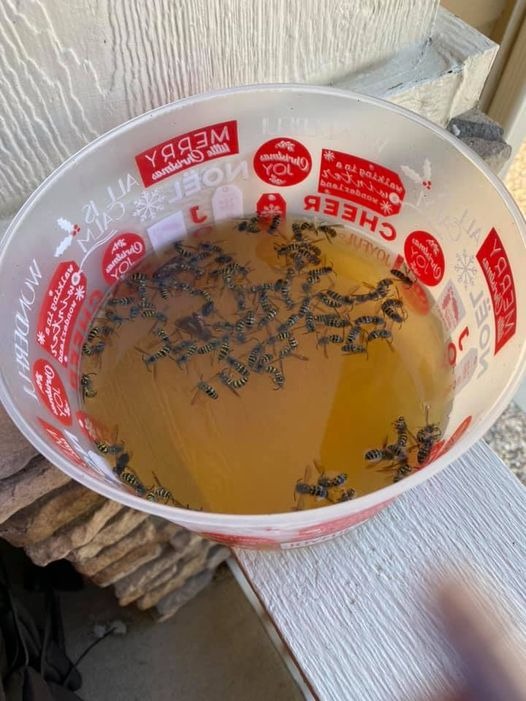ADVERTISEMENT
Simple and Effective Ways to Keep Wasps Away
Wasps can be a nuisance during the warmer months, especially if you’re trying to enjoy a meal outdoors or relax in your garden. Unlike bees, which are generally non-aggressive unless provoked, wasps can be more territorial and are often more likely to sting. If you’re dealing with a wasp problem, you’ll want to take action quickly to avoid attracting them into your space. Thankfully, there are several simple and effective ways to keep wasps away and make your outdoor spaces more enjoyable.
In this article, we’ll explore practical, natural, and even homemade solutions to deter wasps from invading your home and garden.
Why Are Wasps Attracted to Your Yard?
Before diving into the solutions, it’s helpful to understand why wasps are attracted to certain areas. Wasps are generally drawn to:
- Food sources: Sweet foods like fruits, sugary drinks, and food scraps. They are particularly attracted to barbecues and picnics.
- Nesting sites: Wasps often build their nests in sheltered, hidden areas like attics, eaves, sheds, and trees.
- Flowering plants: While bees are the primary pollinators, wasps are also attracted to nectar and can frequent gardens with many blooming flowers.
By understanding what draws wasps, you can take steps to minimize these attractions.
1. Use Essential Oils to Repel Wasps
One of the most natural and effective ways to deter wasps is by using essential oils. Wasps are known to dislike certain scents, making essential oils a powerful tool in your anti-wasp arsenal. Some effective essential oils include:
- Peppermint oil: Wasps find the strong, minty scent of peppermint oil unpleasant. Mixing a few drops of peppermint oil with water and spraying it around areas where you’ve noticed wasp activity can help keep them at bay.
- Eucalyptus oil: Like peppermint, wasps avoid the strong aroma of eucalyptus. You can mix it with water to create a spray or use a diffuser to disperse the scent around your yard.
- Citronella oil: This popular insect repellent is effective against wasps, especially when used in combination with other oils like peppermint.
- Clove oil: Wasps strongly dislike the smell of clove oil. It can be mixed with water and used to spray problem areas.
To make a simple essential oil repellent spray, mix 10-15 drops of essential oil with 1 cup of water in a spray bottle. Shake well before spraying on outdoor surfaces, like picnic tables, trash cans, or areas near your house.
2. Create a Wasp Decoy Nest
Wasps are territorial insects. They typically avoid other colonies and will defend their nests from other wasps. To take advantage of this behavior, you can hang up a decoy wasp nest near your home or garden.
Wasp decoy nests are available for purchase, but you can also make your own. Hang a paper bag or balloon in a tree or on your porch, ideally in a place where wasps are prone to nest. The presence of a decoy nest will send a signal to other wasps that the area is already claimed, and they’ll be less likely to set up shop nearby.
3. Seal Up Potential Nesting Sites
Preventing wasps from nesting around your home is an essential part of keeping them away. Once a wasp colony establishes itself, it can be difficult to remove. To avoid this, inspect your home for potential nesting sites, especially in the late spring or early summer when wasp nests are first being built.
- Seal cracks and crevices: Check areas like window sills, attic vents, or cracks in the siding. Seal up any gaps or holes where wasps could enter and build a nest.
- Inspect outdoor structures: Wasps love to build nests in sheds, garages, and other outdoor structures. Keep doors and windows closed or screen off any openings.
- Cover trash cans: Wasps are attracted to food waste, so make sure your trash cans have tight-fitting lids to minimize odors and food scraps that could draw them in.
4. Remove Food Sources and Clean Regularly
Wasps are naturally attracted to sweet and protein-rich foods, so minimizing these food sources can reduce their attraction to your space. Here are some tips to make your outdoor areas less inviting:
- Cover food and drinks: When eating outdoors, keep food and drinks covered as much as possible. Don’t leave sugary drinks or food scraps unattended.
- Clean up spills immediately: Wasps are especially attracted to sugary liquids. Wipe up any spills of soda, juice, or other sweet beverages quickly.
- Keep food waste in sealed containers: After picnics or barbecues, make sure to dispose of food waste promptly in sealed bags or containers to avoid attracting wasps.
5. Make a Homemade Wasp Trap
If you’re dealing with an existing wasp problem, a homemade trap can help reduce the number of wasps in your area. The key to a successful trap is attracting wasps without drawing other insects like bees. Here’s a simple method:
Materials:
- An empty plastic bottle (2-liter soda bottle works well)
- Sugar water or fruit juice
- Scissors or a knife
For Complete Cooking STEPS Please Head On Over To Next Page Or Open button (>) and don’t forget to SHARE with your Facebook friends
ADVERTISEMENT
ADVERTISEMENT
